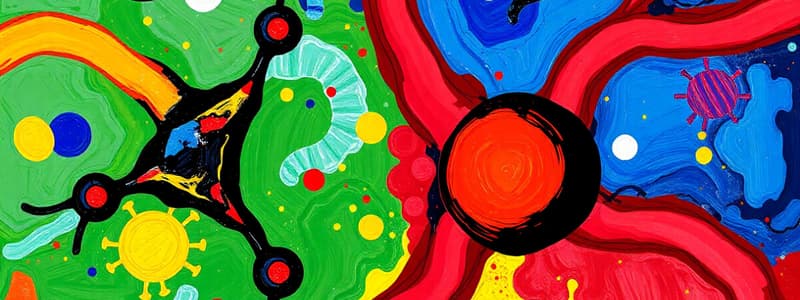Podcast
Questions and Answers
What is the primary use of complement fixation?
What is the primary use of complement fixation?
- To detect very small amounts of antibody. (correct)
- To measure the concentration of antigens.
- To detect high amounts of antibody.
- To identify specific microorganisms directly.
Which diseases were historically diagnosed using the complement fixation test?
Which diseases were historically diagnosed using the complement fixation test?
- Bacterial infections.
- Only viral diseases.
- Autoimmune disorders.
- Syphilis and certain viral diseases. (correct)
Which type of ELISA involves an antigen measuring system?
Which type of ELISA involves an antigen measuring system?
- Competitive binding assay.
- Direct (Sandwich) ELISA. (correct)
- Indirect ELISA.
- Quantitative Immunofluorescence.
In the context of immunofluorescence, what is the purpose of fluorescent dyes?
In the context of immunofluorescence, what is the purpose of fluorescent dyes?
What is a key reason the complement fixation test is being replaced?
What is a key reason the complement fixation test is being replaced?
What is the definition of an antigen?
What is the definition of an antigen?
What is the term for the strength of multiple interactions between multivalent antibodies and antigens?
What is the term for the strength of multiple interactions between multivalent antibodies and antigens?
What occurs when an immune complex involves crosslinking of cells or particles?
What occurs when an immune complex involves crosslinking of cells or particles?
In terms of antibody interactions, what does low affinity imply about the binding of an antibody?
In terms of antibody interactions, what does low affinity imply about the binding of an antibody?
What phenomenon allows an antibody elicited by one antigen to react with unrelated antigens?
What phenomenon allows an antibody elicited by one antigen to react with unrelated antigens?
Which test is used for the quantitative estimation of antibodies?
Which test is used for the quantitative estimation of antibodies?
In immunology, what does complement fixation refer to?
In immunology, what does complement fixation refer to?
Which of the following applications is associated with agglutination reactions?
Which of the following applications is associated with agglutination reactions?
Study Notes
Antigen-Antibody Reactions
- Antigens are molecules or parts that stimulate the generation of antibodies (immunoglobulins).
- Specific regions on antigens recognized by antibodies are termed epitopes.
Affinity and Avidity
- Affinity: Strength of binding between a single antigen (Ag) epitope and an antibody (Ab).
- Low affinity antibodies bind weakly and dissociate quickly.
- High affinity antibodies bind tightly and remain associated longer.
- Avidity: Measures overall binding strength from multiple interactions, providing a more comprehensive binding capacity than affinity.
- High avidity can compensate for low affinity.
Cross Reactivity
- Antibodies generated against one antigen can bind to unrelated antigens if they share similar epitopes or chemical properties.
Immune Complex Formation
- Antibodies typically possess two binding sites, allowing for cross-linking of antigens, resulting in immune complexes.
- Large immune complexes can precipitate out of solution if formed from soluble antigens.
- When immune complexes cross-link cells or particles, agglutination occurs.
Precipitation and Agglutination
- Multivalent antigens can form large lattices with bivalent antibodies based on the antigen-antibody ratio.
- Precipitation produces visible aggregates of alternating antibody and antigen molecules.
Quantitative Estimation of Antibodies
- Mancini Method: Standard for measuring antibodies.
- WIDAL Test: Tube agglutination test used for bacterial infection detection.
Applications of Agglutination Reactions
- Blood cross-matching and grouping.
- Identification of bacteria like Vibrio cholera and Salmonella species.
- Serological diagnosis of diseases such as syphilis and rheumatic fever.
- Detection of unknown antigens in clinical specimens, e.g., Vi antigen in urine.
Complement Fixation
- A group of serum proteins that binds to antigen-antibody complexes during reactions.
- Complement fixation can detect low antibody levels without a visible reaction like precipitation.
- Historically used for syphilis diagnosis (Wassermann test) and is still applicable for some viral and fungal diseases.
- The test consists of two stages: complement fixation and indicator stage.
Enzyme-Linked Immunosorbent Assay (ELISA)
- Types of ELISA:
- Non-competitive binding assay:
- Sandwich or Direct ELISA: Measures antigen using wells coated with antibodies and enzyme-labeled antibodies.
- Indirect ELISA: Measures antibodies with wells coated with antigens and enzyme-labeled secondary antibodies.
- Competitive binding assay: Wells coated with antibodies and enzyme-labeled antigens compete for binding.
- Non-competitive binding assay:
Immunofluorescence Techniques
- Fluorescent dyes (e.g., fluorescein, rhodamine) attached to specific antibodies help detect the presence of antibodies or antigens.
- Direct Fluorescent Antibody Test: Detects antigens or microorganisms directly.
- Indirect Fluorescent Antibody Test: Identifies specific antibodies in serum samples.
- Quantitative immunofluorescence can be performed using flow cytometry.
Studying That Suits You
Use AI to generate personalized quizzes and flashcards to suit your learning preferences.
Related Documents
Description
Explore the fascinating world of antigen-antibody interactions in this quiz. Understand the fundamentals of how antigens trigger antibody generation and the significance of affinity in these reactions. Test your knowledge on the specifics of immunoglobulins and their binding characteristics.




